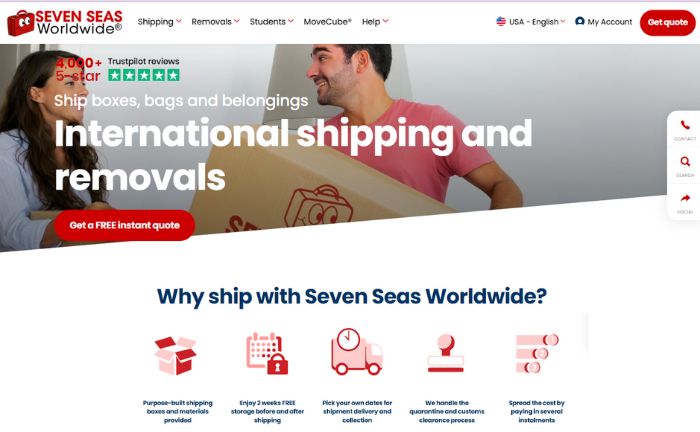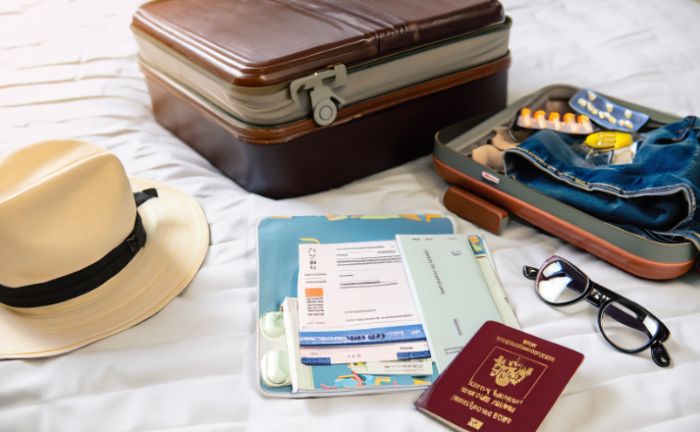Studying abroad offers a rich, immersive experience in a new culture, broadening horizons and fostering an appreciation for cultural diversity. It provides valuable academic opportunities, including unique courses, learning from expert professors, and acquiring new languages, a crucial skill in our globalized world. Additionally, it creates unforgettable memories through making new international friends, exploring different places, and participating in unique activities.
Whether it’s books, clothing, or sentimental items, ensuring their safe arrival is crucial. In this article, we offer advice and recommendations on how to pack and ship your items when studying abroad, ensuring a smooth experience and avoiding unnecessary mishaps.
Choose a Reliable Shipping Method
Selecting the correct shipping method is crucial to ensure your personal items’ safe and timely arrival—research various shipping options, such as international couriers, freight forwarders, or postal services. Consider cost, delivery time, tracking capabilities, and insurance coverage.
Overseas shipping with www.sevenseasworldwide.com is also an option to ensure your belongings arrive safe and sound. Choosing a reputable shipping provider with experience in handling international shipments is advisable. Remember to inquire about customs regulations or documentation required for your destination.
What is Seven Seas Worldwide?

Assess Your Needs and Create a Packing List
Before you start packing and shipping, assessing your needs and creating a comprehensive packing list is essential. Consider the duration of your study abroad program, the climate of your destination, and any specific requirements or restrictions from your university or host country.
This will help you determine what items must bring along and what can be left behind or purchased locally. Having a clear packing list will also assist you in estimating the size and weight of the shipment.
Secure and Protect Your Items
When sending personal items, securing and protecting them adequately is essential to reduce the risk of damage during shipping. Use sturdy and durable materials for packing, such as double-wall boxes, bubble wrap, and air.

For fragile items, wrap them individually and ensure adequate cushioning to absorb any impact or shock. Additionally, consider using waterproof packaging or plastic bags to shield your belongings from moisture.
Label each package with your name, contact information, and destination address. There are also cardboard shipping boxes and packing supplies available.
Consider Customs and Import Duties
Shipping personal items internationally often involves dealing with customs regulations and potential import duties. Familiarize yourself with the customs requirements of your destination country to avoid any surprises or delays.
Certain items like electronics or restricted goods may require additional documentation or permits. Keep receipts or proof of purchase for valuable items to facilitate customs clearance. It’s also advisable to check if any import duties or taxes apply to your articles and budget accordingly.

-
Research customs regulations: This involves investigating the rules and regulations of the destination country regarding what items are allowed to be brought in and which are restricted or completely prohibited. This step is crucial to avoid any legal issues upon arrival.
-
Documentation requirements: Some items, such as electronics, may need to comply with specific technical standards or require voltage converters. It’s essential to determine if there are any specific documentation requirements for these items to ensure they can be legally and safely transported.
-
Permits or licenses: Certain items, like firearms, medications, or specific agricultural products, may require special permits or licenses for importation. It’s essential to check these requirements beforehand to avoid confiscation or penalties.
-
Receipts for valuable items: Keeping all receipts or proof of purchase for valuable items can help demonstrate their value and facilitate customs clearance if required. This can be particularly important for expensive electronics, jewelry, or antiques.
-
Import duties or taxes: Import duties or taxes may be levied on personal items. It’s essential to check the threshold limits for duty-free importation, as exceeding them may result in additional costs.
-
Consult a customs broker: A customs broker or the customs authority of the destination country can provide specific guidance and advice on the importation process. They can help navigate complex customs procedures and ensure all requirements are met.
-
Fill out customs forms: Customs forms must be filled out accurately and completely, providing detailed descriptions of the contents and their values. This is a crucial step in the customs process and can help avoid delays or issues with customs clearance.
Plan and Allow Sufficient Time
To ensure a smooth shipping process, it is crucial to carefully plan and allow sufficient time for your items to reach their destination. Remember that international shipments often take longer than domestic shipments, especially when customs clearance is involved.
Do thorough research to determine the estimated delivery times associated with various shipping methods, allowing for the possibility of unforeseen delays. It is highly recommended that you ship your belongings well in advance, ideally several weeks before your planned departure.

This will give you peace of mind and allow for any unexpected circumstances that may arise during the complicated shipping process.
Keep a Digital Inventory and Backup Important Documents
While shipping your items, keeping a digital inventory of all the things you’re sending is crucial. Take photos or create a detailed list of the contents in each package. This will be helpful for insurance claims in case of any loss or damage during transit. Additionally, make digital copies of important documents such as passports, visas, and customs forms.
Store these backups securely in the cloud or on a password-protected device. A digital record will save you from unnecessary stress if any physical documents get misplaced or damaged during shipping.
Stay Organized and Track Your Shipment
Maintaining organization throughout the shipping process is crucial for a smooth experience. Keep a record of each package you ship, including the contents, tracking numbers, and estimated delivery dates. This will help you track the progress of your shipment and ensure everything is on schedule.
Most shipping providers offer online tracking services that allow you to monitor your packages in real time. Take advantage of these tools to stay informed about the whereabouts of your items. If any issues or delays arise, promptly contact the shipping provider for assistance and updates.
Consider Traveling with Essential Items
When journeying abroad, carrying essential items with you is advisable instead of shipping them. This encompasses crucial documents like your passport, visa, academic records, medications, and valuables.
Keeping these items in your carry-on luggage ensures accessibility and reduces the risk of loss or damage during transit. Packing a few days’ worth of clothing and toiletries is also prudent to prepare for potential delays in the arrival of your shipped belongings.

Shipping your possessions while studying abroad necessitates meticulous planning and attention to detail. By evaluating your needs, selecting a trustworthy shipping method, ensuring your items, understanding customs regulations, and allowing sufficient time, you can facilitate a seamless shipping experience.
Thoroughly planning and organizing your belongings is paramount when planning a journey. Establishing a digital inventory, which involves compiling a comprehensive list or record of all items you carry, is a safety net in case of loss or theft.
Taking these precautions provides peace of mind by ensuring your belongings and important documents are secure and allows you to maximize your study abroad experience, confident in the knowledge that your possessions will reach your destination safely.
References
- Ellett, Paul. “8 Mistakes Students Make When Packing to Move Abroad.” Hotcoursesabroad: International Study Options Platform, HotcoursesAbroad, 8 Oct. 2014, https://www.hotcoursesabroad.com/study-abroad-info/before-you-leave/8-mistakes-students-make-when-packing-to-move-abroad/.
- Watson, Andrew. “What to Pack for a Year Studying Abroad: Essential Packing List.” Sherpr, https://www.facebook.com/sherprdelivery/, 26 Nov. 2021, https://www.sherpr.com/en/what-to-pack-for-a-year-studying-abroad/.
- “What to Pack for Your University Study | Baylor University International Study Center.” Baylor University International Study Center | Study Abroad in the USA, https://isc.baylor.edu/blog/what-to-pack-for-your-university-study.
She has a degree in Social Communication (graduated in 2010). Arianna has experience in research and writing about universities, credit cards, procedures and insurance, among other topics related to finance in general.
With more than ten years of experience, she has worked in different local and digital media, writing on various issues related to the economy and international politics. She has also coordinated teams of editors, gaining experience in managing groups.
She was born in Merida, Venezuela. She lived in Wausau, Wisconsin, for 5 years, allowing her to learn English. Being bilingual, she also does research and writing in Spanish.
She has taken TOEFL exams and English proficiency tests (passed), so she is qualified to write texts in English.


